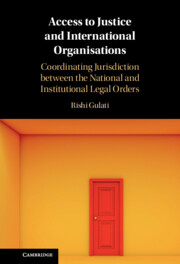 Access to Justice and International Organisations
Access to Justice and International Organisations Published online by Cambridge University Press: 10 March 2022
This chapter develops the criteria relevant to assess a dispute resolution mechanism or DRM’s compliance with fair trial standards. The discussion focuses on the three broad fair trial guarantees that an institutional DRM must incorporate if it is to be considered appropriate. These are independence, impartiality and fairness. First, the discussion shows that for a DRM to be considered independent, it must possess institutional, decisional and personal/individual independence. Those three aspects will be explained succinctly. The chapter then focuses on the concept of judicial impartiality. For a fair trial to be provided, impartiality in its objective and subjective sense is critical. Finally, the chapter demonstrates how the right to a fair trial also demands that a claimant is treated fairly. Fairness is a broad guarantee and is explored through seven sub-component fair trial rights. Fairness cannot be achieved unless the right to equal access to the courts, the right to equality of arms, the right to an oral hearing, the right to appeal, the right to a reasoned judgment, the right to access justice without undue delay and the right to an effective remedy are provided for in the law, and importantly, practically realised.
To save this book to your Kindle, first ensure [email protected] is added to your Approved Personal Document E-mail List under your Personal Document Settings on the Manage Your Content and Devices page of your Amazon account. Then enter the ‘name’ part of your Kindle email address below. Find out more about saving to your Kindle.
Note you can select to save to either the @free.kindle.com or @kindle.com variations. ‘@free.kindle.com’ emails are free but can only be saved to your device when it is connected to wi-fi. ‘@kindle.com’ emails can be delivered even when you are not connected to wi-fi, but note that service fees apply.
Find out more about the Kindle Personal Document Service.
To save content items to your account, please confirm that you agree to abide by our usage policies. If this is the first time you use this feature, you will be asked to authorise Cambridge Core to connect with your account. Find out more about saving content to Dropbox.
To save content items to your account, please confirm that you agree to abide by our usage policies. If this is the first time you use this feature, you will be asked to authorise Cambridge Core to connect with your account. Find out more about saving content to Google Drive.